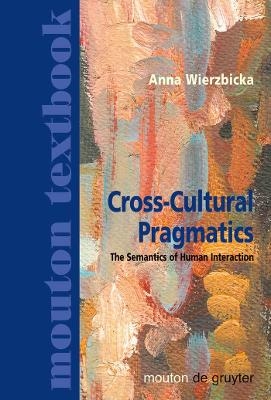
Cross-Cultural Pragmatics
de Gruyter Mouton (Verlag)
978-3-11-017769-5 (ISBN)
- Titel gebraucht verfügbar
- Artikel merken
Anna Wierzbicka is Professor at Australian National University, Canberra.
Chapter 1 Introduction: semantics and pragmatics
1. Language as a tool of human interaction
2. Different cultures and different modes of interaction
3. Pragmatics - the study of human interaction
4. The natural semantic metalanguage
5. The need for a universal perspective on meaning
6. The uniqueness of every linguistic system
7. The problem of polysemy
8. Semantic equivalence vs. pragmatic equivalence
9. Universal grammatical patterns
10. Semantics vs. pragmatics: different approaches
11. Description of contents
Chapter 2 Different cultures, different languages, different speech acts
1. Preliminary examples and discussion
2. Interpretative hypothesis
3. Case studies
4. Cultural values reflected in speech acts
5. Theoretical implications
6. Practical implications
Chapter 3 Cross-cultural pragmatics and different cultural values
1. 'Self-Assertion'
2. 'Directness'
3. Further illustrations: same labels, different values
4. Different attitudes to emotions
5. Conclusion
Chapter 4 Describing conversational routines
1. Conversational analysis: linguistic or non-linguistic pragmatics?
2. 'Compliment response' routines
3. 'Compliment responses' in different cultures
Chapter 5 Speech acts and speech genres across languages and cultures
1. A framework for analysing a culture's 'forms of talk'
2. Some Australian speech-act verbs
3. Some examples of complex speech genres
4. Conclusion
Chapter 6 The semantics of illocutionary forces
1. Are illocutionary forces indeterminate?
2. More whimperative constructions
3. Additional remarks on the explication of illocutionary forces
4. Selected conversational strategies
5. Tag questions
6. Personal abuse or praise: You X!
7. Illocutionary forces of grammatical and other categories
8. Comparing illocutionary forces across languages
9. Conclusion
Chapter 7 Italian reduplications: its meaning and its cultural significance
1. Italian reduplication: preliminary discussion
2. Discourse and illocutionary grammar
3. The illocutionary force of clausal repetition
4. The illocutionary force of Italian reduplication
5. Clausal repetition as a means of 'intensification'
6. The absolute superlative in Italian and in English
7. Illocutionary grammar and cultural style
8. Conclusion
Chapter 8 Interjections across cultures
1. Preliminary discussion
2. Volitive interjections
3. Emotive interjections
4. Cognitive interjections
5. Conclusion
Chapter 9 Particles and illocutionary meanings
1. English quantitative particles
2. English temporal particles
3. Polish temporal particles
4. Polish quantitative particles
5. Conclusion
Chapter 10 Boys will be boys: even 'truisms' are culture-specific
1. The meaning of tautologies
2. English nominal tautologies: semantic representations
3. Some comparisons from Chinese and Japanese
4. Verbal tautologies
5. Is there a semantic invariant?
6. The deceptive form of English tautological constructions
7. The culture-specific content of tautological patterns
8. Conclusion
Chapter 11 Conclusion: semantics as a key to cross-cultural pragmatics
"The book can be regarded as a recapitulation of results obtained in all former scholarly projects carried by its author. [It] is one if the best manuals of widely understood pragmatics and ethnolinguistics of human speech, the more so as the traditoinal grammars and handbooks of linguistics usually leave the ethnography of speech in the background of linguistics analyses."
Tomasz Wicherkiewicz in: Linguistics and Oriental Studies from Poznan
| Erscheint lt. Verlag | 19.3.2003 |
|---|---|
| Reihe/Serie | Mouton Textbook |
| Verlagsort | Berlin/Boston |
| Sprache | englisch |
| Maße | 155 x 230 mm |
| Gewicht | 785 g |
| Themenwelt | Geisteswissenschaften ► Sprach- / Literaturwissenschaft ► Sprachwissenschaft |
| Schlagworte | HC/Allgemeine und Vergleichende Sprachwissenschaft • Illokutiver Akt • Intercultural communication • Kulturvergleich • Pragmatics • Pragmatik • Semantics • Semantik • Speech acts (Linguistics) • Sprachliche Interaktion • Taschenbuch / Allgemeine und Vergleichende Sprachwissenschaft • TB/Allgemeine und Vergleichende Sprachwissenschaft |
| ISBN-10 | 3-11-017769-2 / 3110177692 |
| ISBN-13 | 978-3-11-017769-5 / 9783110177695 |
| Zustand | Neuware |
| Haben Sie eine Frage zum Produkt? |
aus dem Bereich



